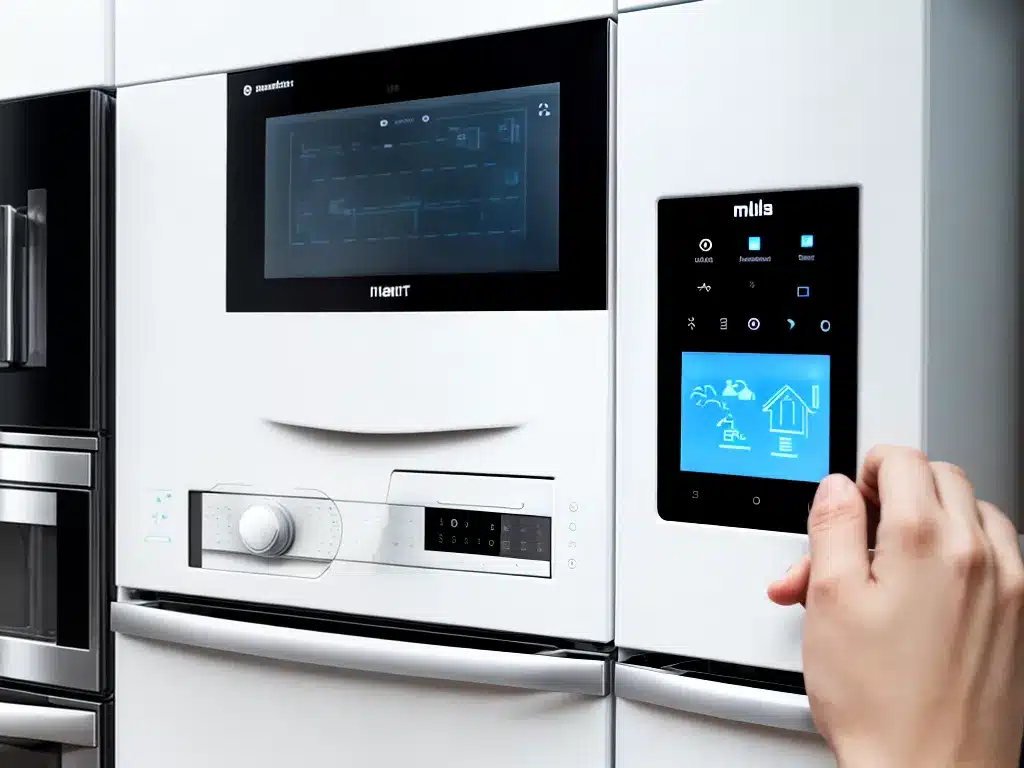
The idea of a “smart home” filled with interconnected appliances and devices is quickly becoming a reality. Smart appliances and other internet-connected products are bringing convenience, efficiency, and innovative capabilities into our homes. As more appliances gain “smart” features and integrate with home automation systems, the home of the future is taking shape.
How Smart Appliances Work
Smart appliances connect to the internet and other devices through Wi-Fi or Bluetooth. They can be controlled and monitored remotely using a smartphone app or voice commands to a virtual assistant like Amazon Alexa or Google Assistant.
Some key features of smart appliances include:
- Remote control – Adjust settings, turn on/off, etc. from your smartphone anywhere.
- Usage monitoring – Check cycles completed, energy use, condition status.
- Scheduling – Set schedules for when appliances run.
- Alerts – Get notifications if repairs are needed.
- Voice control – Use voice commands to control appliances.
- Automation – Have appliances start/stop based on preferences, usage patterns and more.
This connectivity and remote access offers greater flexibility, insight, and management of home appliances.
Benefits of Smart Appliances
Integrating smart appliances into the connected home provides many potential benefits:
- Convenience – Control appliances remotely, get alerts, etc.
- Efficiency – Optimize energy use, schedule tasks for off-peak times.
- Savings – Reduce energy waste, extend appliance lifespan.
- Customization – Tailor appliance functions to match lifestyle and preferences.
- Insight – View usage patterns and habits to improve operations.
- Troubleshooting – Diagnose problems remotely, expedite repairs.
- Accessibility – Control appliances via voice commands or other accessibility features.
Smart Appliance Categories
Many appliance categories now include smart models:
Smart Refrigerators
- Display contents on screen or smartphone app
- Optimize cooling and track usage
- Automate ordering of frequent grocery items
Smart Washing Machines
- Get alerts when laundry is finished
- Schedule cycles to take advantage of lower energy rates
- Receive notifications about detergent low or maintenance needed
Smart Ovens
- Preheat remotely and control cooking functions from an app
- Monitor doneness of items via built-in cameras
- Provide access to hundreds of preprogrammed recipes
Smart Dishwashers
- Get notified when cycles complete
- Delay start to run during lower electricity rate periods
- Monitor detergent levels and signal when running low
Smart Air Conditioners
- Adjust temperature and settings from anywhere
- Develop cooling schedules customized to usage patterns
- Integrate with smart vents to optimize whole home climate control
And many more categories like smart water heaters, smart vacuums, and smart home security systems are emerging.
The Connected Home Ecosystem
To realize the full potential of smart appliances, they need to connect to a broader smart home ecosystem:
- A home automation hub or controller to integrate all devices.
- Smart speakers and displays to enable voice control and visual interfaces.
- Mobile apps to access appliance controls and data from smartphones/tablets.
- Home automation protocols like Zigbee, Z-Wave, Wi-Fi, and Thread that enable communication.
- AI and machine learning to analyze usage data for predictive automation.
As more appliances link to hubs, apps, and virtual assistants, it enables advanced automations, unified control, and rich insights across the home.
The Future of Smart Appliances
The smart home market is still emerging, but rapid innovation and adoption of connected appliances is underway. Key trends powering the home of the future include:
- Mainstream adoption – Smart appliances going from niche to norm.
- Expanded capabilities – Appliances gaining increasingly advanced smart features.
- Total integration – All appliances seamlessly connecting for unified control.
- Predictive automation – Appliances self-managing based on learned usage patterns and preferences.
- Voice-enabled lifestyles – Virtual assistants becoming primary interface for appliance control.
- Proactive maintenance – Appliances self-diagnosing issues and facilitating proactive repairs.
Smart appliances promise to reshape how we live at home. While convenience and efficiency are often the initial motivation for adoption, the long-term effects of smart appliances on lifestyles, habits, and experiences could be profound. The home of the future is arriving now – one smart appliance at a time.












